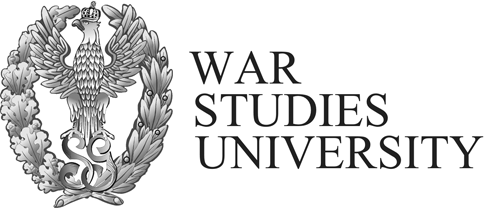Online first
Current issue
All issues
About
Aims and scope
Peer review process
Publication policy and ethics & malpractice statement
Editorial Board
Reviewers
Publisher
Guide for authors
Call for papers
Book Reviews
Special Issues Archive
New and emerging technologies in defence education, training and governance
Mediation in armed conflict
1
War Studies University
Publication date: 2017-12-31
Security and Defence Quarterly 2017;17(4):74-99
KEYWORDS
ABSTRACT
Mediation is one of the most commonly used methods for solving armed conflicts due to
its flexibility allowing parties to freely decide about their participation in the mediation,
the choice of a mediator, and accepting or rejecting the conditions of conflict resolution
established during the mediation process. The article looks at various approaches to mediation, leading to an indication of the nature
and attributes of this method of solving armed conflicts. It also analyses the motives of the
main actors of mediation - the parties’ of the conflict and the mediator, which are taken
into consideration when they decide to start mediation. The research allows a better understanding of the complexity of mediation in an armed
conflict. It enables the motives of the conflicting parties and mediator which have an impact
on the mediation process and result to be identified.
REFERENCES (67)
1.
Barcik, J., Srogosz, T., 2007. Prawo międzynarodowe publiczne. Wydawnictwo C.H. Beck, Warsaw.
2.
Bargiel-Matuszewicz, K., 2007. Negocjacje i mediacje. Polskie Wydawnictwo Ekonomiczne, Warsaw.
4.
Baumann, J. and Clayton, G., 2017. Mediation in violent conflict. In CSS Analyses in Security Policy, 211. [online] Available from: http://www.css.ethz.ch/content... ethz/special-interest/gess/cis/center-for-securities-studies/pdfs/CSSAnalyse211- EN.pdf [Accessed 27 Oct 2017].
5.
Beardsley, K., 2011. The Mediation Dilemma. Cornel University Press, New York.
doi: 10.7591/cornell/9780801450037.001.0001.
6.
Bercovich, J. and Houston, A., 1996. The study of international mediation: Theoretical issues and empirical evidence. In J. Bercovich (ed.), Resolving International Conflicts: The Theory and Practice of Mediation. Lynne Reinner, Boulder-London. doi: 10.1177/03058298960250010909.
7.
Bercovitch J. and Derouen, K. Jr., 2004. Mediation in Internationalized Ethnic Confl icts: Assessing the Determinants of a Successful Process. Sage Journals, 30(2), 147-170. doi: 10.1177/0095327X0403000202.
8.
Bercovitch, J., Jackson R., 2009. Conflict Resolution in the Twenty-first Century. University of Michigan Press, Ann Arbor. doi: 10.3998/mpub.106467.
9.
Bercovitch, J. and Jackson, R., 2001. Negotiation or Mediation? An Exploration of Factors Affecting the Choice of Conflict Management in International Conflict. Negotiation Journal, 17(1), 59-77. doi: 10.1111/j.1571-9979.2001.tb00227.x.
10.
Bercovitch, J., 1994. The structure and diversity of mediation in international relations. In J. Bercovitch (ed.), Mediation in International Relation. Multiple Approaches to Conflict, Macmillan, London.
11.
Bühring-Uhle, Ch., 1996. Arbitration and Mediation in International Business. Kluwer Law International, Th e Hague/London/Boston.
12.
Camisar, A., Diechtiareff , B., Letica, B., and Switzer, C., 2005. An Analysis of the Dayton Negotiations and Peace Accords. Final Research Paper, Th e Fletcher School of Law and Diplomacy. [online] Available from: http://ocw.tufts.edu/data/12/2... [Accessed 27 Oct 2017].
13.
Carment, D. P. and James, P., 2000. Explaining third-party intervention in ethnic confl ict: theory and evidence. Nations and Nationalism, 6 (2), 173-202.
doi: 10.1111/j.1354-5078.2000.00173.x.
14.
Charter of United Nations, [online] Available from: http://www.unic.un.org.pl/doku... karta_onz.php/ [Accessed 20 Oct 2017].
15.
Clayton, G., 2013. Relative rebel strength and the onset and outcome of civil war mediation. Journal of Peace Research, 50(5), 609-622.
doi: 10.1177/0022343313491587.
16.
Coolidge, J.C., IMI Code of Professional Conduct. International Mediation Institute, [online] Available from: https://imimediation.org/imi-c... [Accesed 25 Oct 2017].
17.
Cortright, D. and Lopez, G.A. (eds), 2000. Th e Sanction Decade. Lynne Reinner Publishers, Boulder-London.
18.
Cortright, D. and Lopez, G.A. (eds), 2002. Sanction and the Challenges to UN Action. Lynne Reinner Publishers, Boulder-London.
19.
Crocker, C.A., Hampson, F.O. and Aall, P.R., 2003. Ready for prime time: the when, who and way of international mediation. Negotiation Journal, 19(2), 151-167. doi: 10.1111/j.1571-9979.2003.tb00773.x.
20.
Eriksson, L., 2011. Rational Choice Th eory: Potential and Limits. Palgrave Mac Millan, New York. doi: 10.1007/978-0-230-34379-5_2.
21.
Faure, G.O., 1989. Th e mediators as third negotiators. In E. Mautner-Markhof (ed.), Process of International Negotiations. Westview, Boulder.
22.
Fisas, V., Mediation in armed confl icts. [online] Available from: http://escolapau.uab.cat/ img/programas/procesos/ mediation_armed.pdf [Accessed 21 Oct 2017].
23.
Folberg, J., Golanna, D., Kloppenberg, W., and Stipanowich, T., 2005. Resolving Disputes. Th eory, Practice and Law. Wolters Kluwer Law & Business, New York.
24.
Gent, S. and Shannon, M., 2010. Th e eff ectiveness of international arbitration and adjudication: Getting into a bind. Journal of Politics, 72(2), 366-380.
doi: 10.1017/S0022381609990788.
25.
Gibadło, L. 2017. Walka z ISIS po szczycie NATO. „Eliminacja” zamiast „wojny na wyczerpanie”. Defence24, 31 May. [online] Available from: http:// defence24.pl/walka- z-isis-po-szczycie-nato-eliminacja-zamiast-wojny-na-wyczerpanie [Accessed 23 Oct 2017].
26.
Giessmann, H.J. and Wils, O., 2011. Seeking Compromise? Mediation Th rough the Eyes of Confl ict Parties, [online] Available from: http://peacemaker.un.org/sites.... un.org/fi les/Seeking%20Compromise_BerghofFoundation%202011_0.pdf [Accessed 23 Oct 2017].
27.
Greig, J.M. and Regan, P.M., 2008. When do they say yes? An analysis of the willingness to off er and accept mediation in civil wars. International Studies Quarterly, 52(4), 759-781. doi: 10.1111/j.1468-2478.2008.00525.x.
28.
Griffi ths, A. and Barnes, C., 2008. Powers of persuasion: Incentives, sanctions and conditionality in peacemaking. Accord Coalition Resource, 19, London.
29.
Herrberg, A., 2012. International Peace Mediation: A New Crossroads for the European Union. DCAF Brussels - ISIS Europe 2012.
30.
Independent Commission on Multilateralism, 2016. Armed Confl ict: Mediation, Conciliation, and Peacekeeping, [online] Available from: https://www.icm2016.org/ IMG/pdf/armed_confl ict_discussion_paper-2.pdf [Accessed 20 Oct 2017).
31.
Jackson, E., 1952. Meeting in Minds. A Way to Peace Th rough Mediation. McGraw-Hill, New York.
32.
Kleiboer, M., 1996. Understanding success and failure of international mediation. Journal for Confl ict Resolution, 40(2), 360-389.
doi: 10.1177/0022002796040002007.
34.
Kydd, A., 2003. Which side are you on? Bias, credibility and mediation. American Journal of Political Science, 47(7). doi: 10.1111/1540-5907.00042.
35.
Lundgren, M., 2016. Mediation in Syria: Initiatives, strategies, and obstacles, 2011-2016. Contemporary Security Policy, 37(2), 273-288.
doi: 10.1080/13523260.2016.1192377.
36.
Matheson, M.J., 2006. Council UNBound. United States Institute of Peace Press, Washington D.C.
37.
Maundi, M., Zartman, W., Khadiagala, G., and Nuamah, K., 2006. Getting in: Mediators’ Entry into the Settelment of African Confl icts. United State Institute of Peace, Washington DC.
38.
Mayer, B., 2000. Th e Dynamic of Confl ict Resolution. Jossey-Bass, San Francisco.
39.
Melin, M. and Koch, M., 2009. Jumping into the fray: Alliances, power, institutions, and the timing of confl ict expansion. International Interactions, 35(3), 1-27. doi: 10.1080/03050620903328696.
40.
Melin, M. and Svensson, I., 2009. Incentives for talking: Accepting mediation in international and civil wars. International Interaction, 35, 249-271.
doi: 10.1080/03050620903084521.
41.
Melin, M.M., Gartner, S.S., and Bercovitch, J., 2013. Fear of rejection: Th e puzzle of unaccepted mediation off ers in international confl ict. Confl ict Management and Peace Science, 30(4), 354-368. doi: 10.1177/0738894213491358.
42.
Michael, G.J., 2015. Rebels at the gates: Civil war, battle locations, movement, and openings -for mediation. International Studies Quarterly, 59(4), 680-693.
43.
Miłosz, S., 1996. Środki i Metody Pokojowego Załatwiania Sporów Międzynarodowych. Akademia Obrony Narodowej, Warsaw.
44.
Miranda, A., 2014. Th e origins of mediation and the A.D.R. tools. In A. Miranda (ed.), Mediation in Europe at the cross-road of diff erent legal cultures. Arcane, Rome.
45.
Mitchell, S.M. and Powell E.J., 2011. Domestic Law Goes Global: Legal Traditions and International Courts. Cambridge University Press, Cambridge.
doi: 10.1017/CBO9780511783036.
46.
Moore, Ch.W., 2012. Mediacje: Praktyczne Strategie Rozwiązywania Konfl iktów. Ofi cyna, Warsaw.
47.
Moore, Ch.W., 2003. Th e Mediation Process. Practical Strategies for Resolving Confl ict. John Wiley & Sons, San Francisco.
48.
Myerson, R.B., 1997. Game Th eory: Analysis of Confl ict. Harvard University Press.
50.
Pawłowski, K., 2007. Spory i konfl ikty międzynarodowe. In M. Pietraś (ed.), Międzynarodowe stosunki polityczne. Wydawnictwo UMCS, Lublin.
51.
Perrin, B., 2012. Modern Warfare: Armed Groups, Private Militaries, Humanitarian Organizations, and the Law. UUBC Press, Vancouver-Toronto.
52.
Rau, A., Sherman, E., and Peppet S., 2006. Process of dispute resolution. Foundation Press.
53.
Ruhe, C., 2015. Anticipating mediated talks: Predicting the timing of mediation with disaggregated confl ict dynamics. Journal of Peace Research, 52(2), 243-257. doi: 10.1177/0022343314558101.
54.
Sarkozy steps up mediation eff orts over Georgia, [online] Available from: https://www. euractiv.com/section/global-europe/news/sarkozy-steps-up-mediation-eff orts-over- georgia/ [Accessed 27 Oct 2017].
55.
Sticher, V. (ed.), 2015. Challenges to mediation support in hot wars: Learnings from Syria and Ukraine. Discussion Points of the Mediation Support Network, 7.
57.
Th e European Code of Conduct for Mediators. [online] Available from: ec.europa.eu/ civiljustice/adr/adr_ec_code_ conduct_en.pdf [Accesed 25 Oct 2017].
58.
Touval, S., 1985. Th e Context of mediation. Negotiation Journal, 4 (1), 373-378.
doi: 10.1111/j.1571-9979.1985.tb00327.x.
59.
Wall, J. and Lynn, A., 1993. Mediation: A current review. Journal of Confl ict Resolution, 37 (1), 160-194. doi: 10.1177/0022002793037001007.
60.
Walter, B., 2009. Bargaining failure and civil war. Annual Review of Political Science, 12 (1). doi: 10.1146/annurev.polisci.10.101405.135301.
61.
Waszkiewicz, P., 2014. Zasady mediacji. In E. Gmurzyńska, R. Morek (eds), Mediacje. Teoria i praktyka, Wolters Kluwer, Warszawa 2014.
62.
Young, O., 1967. Th e Intermediaries. Th ird Parties in International Crises. Princeton University Press, Princeton 1967. doi: 10.1515/9781400876549.
63.
Zartman, I.W., 2000. Ripeness: Th e hurting stalemate and beyond. In P.C. Stern and D. Druckman (eds), International Conflict Resolution after the Cold War. National Academies Press, Washington DC, 225-250.
64.
Zartman, I.W. and Touval, S., 2006. Mediation: Th e role of third-party diplomacy and informal peacemaking. In S. Brown and K.M. Schraub (eds), Resolving Th ird World Conflict. United States Institute of Peace Press, Washington, D.C.
65.
Zartman, I.W., 2008. Th e time of peace initiatives: hurting stalemates and ripe moments. In J. Darby and R. MacGinty (eds), Contemporary Peacemaking: Confl ict, Peace Processes and Post-War Reconstruction. Palgrave MacMillan, New York. doi: 10.1057/9780230584556_3.
66.
Zartman, I.W. and Touval, S., 2006. Mediation: Th e role of third-party diplomacy and informal peacemaking. In Brown S., Schraub K.M. (eds.) Resolving Th ird World Confl ict. United States Institute of Peace Press, Washington, D.C.
67.
Zartman, I.W. and Touval, S., 1985. International mediation: Confl ict resolution and power politics. Journal of Social Issues, 41 (2), 27-45.
doi: 10.1111/j.1540-4560.1985.tb00853.x.
CITATIONS (3):
1.
DAĞLIK KARABAĞ SORUNUNDA ULUSLARARASI ARABULUCULUK
Büşra ÖĞÜTÇÜ, Muzaffer YILMAZ
Giresun Üniversitesi İktisadi ve İdari Bilimler Dergisi
Büşra ÖĞÜTÇÜ, Muzaffer YILMAZ
Giresun Üniversitesi İktisadi ve İdari Bilimler Dergisi
2.
Analiza czynników warunkujących sukces prowadzenia negocjacji kryzysowych
Dorota DOMALEWSKA
Studia Administracji i Bezpieczeństwa
Dorota DOMALEWSKA
Studia Administracji i Bezpieczeństwa
3.
Legal nature of mediation in the conditions of armed conflict
Olha Sliusarenko
Visnyk Taras Shevchenko National University of Kyiv. Military-Special Sciences
Olha Sliusarenko
Visnyk Taras Shevchenko National University of Kyiv. Military-Special Sciences
We process personal data collected when visiting the website. The function of obtaining information about users and their behavior is carried out by voluntarily entered information in forms and saving cookies in end devices. Data, including cookies, are used to provide services, improve the user experience and to analyze the traffic in accordance with the Privacy policy. Data are also collected and processed by Google Analytics tool (more).
You can change cookies settings in your browser. Restricted use of cookies in the browser configuration may affect some functionalities of the website.
You can change cookies settings in your browser. Restricted use of cookies in the browser configuration may affect some functionalities of the website.




